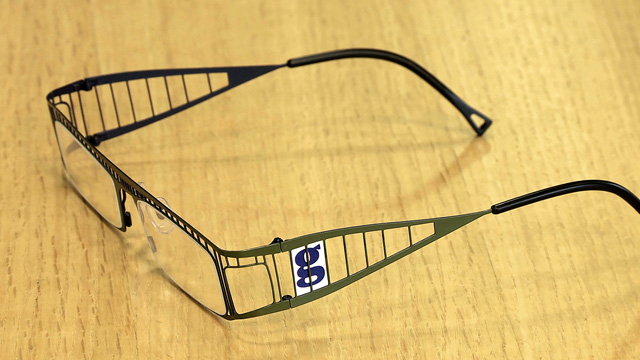Realidad Aumentada.
Mas real que la realidad.
el Video aqui.
Guardian launches 'augmented reality' specs to offer immersive liberal insight
Guardian Goggles' anti-bigotry technology will automatically redact columns by Melanie Phillips or Richard Littlejohn
You can already access the Guardian in ways that were unimaginable two decades ago: on your desktop or laptop computer, a tablet, e-reader or smartphone.But today, ending months of speculation and rumour, this newspaper announces a groundbreaking development in the modern history of the media: a pair of web-connected "augmented reality" spectacles that will beam its journalism directly into the wearer's visual field, enabling users to see the world through the Guardian's eyes at all times.
The motion-sensitive spectacles, known as Guardian Goggles, incorporate translucent screens in the lenses, overlaying the wearer's view of their surroundings with a real-time stream of specially curated opinions from the paper's reporters, critics and commentators. For example, simply by looking at the outside of a restaurant or cinema and pointing, the user can call up relevant Guardian reviews of the food or current films.
"For some time, our users have been telling us they want an even more immersive Guardian experience, without the hassle of having to reach for their phones, or switch on their iPads, and Guardian Goggles are the answer," a spokesperson said.
"Now, when you're out shopping, you needn't have memorised our recent features on ethically sourced foods. Just call up the 'Mini-Monbiot' app, and the products you're looking at will be rated in front of your eyes."
Related software can detect the destinations featured in holiday brochures, warning wearers before they book trips to countries with problematic human rights records.
The spectacles also feature optional built-in anti-bigotry technology, which prevents exposure to non-Guardian opinions by blacking out columns by Melanie Phillips or Richard Littlejohn, among other writers, as soon as the user attempts to look at them.
Media analysts predicted that the Goggles could have a tectonic effect on the media landscape. "This is the easily biggest development in news technology since newspapers opened 'virtual bureaus' in Second Life in 2006, transforming journalism forever," said Paul McMullan, the former tabloid journalist who is now Professor of Disruptive Thinkovation at City University in London. "I frankly wouldn't be surprised if this were an even bigger success than Google+."
Another Goggles app, currently in development, will allow readers with strong feelings about postings on the Guardian's Comment Is Free site simply to yell their objections out loud, for example in the street, or on a bus. A voice-recognition system will then add their opinions to the relevant web page within 30 seconds.
An algorithm designed to detect frequently recurring viewpoints -- for example, that the Guardian should not be wasting valuable internet space by running blog posts about fashion or celebrities -- will enable those to be added to the site even faster.
A still more ambitious project could see the G2 columnist and psychotherapist Pamela Stephenson Connolly delivering sex-related advice in real time.
A limited-edition designer model, evoking the shape of the letter "g" from the Guardian's masthead, has been specially created by a collective of avant-garde designers working in association with Christopher Biggins.
Already the glasses, a limited number of which have been given to prominent public figures for testing, have attracted a number of high-profile fans, including at least one cabinet minister. Meanwhile, a spokesman for St James's Palace said both the Duke and Duchess of Cambridge were enjoying using the product, despite Prince William's grandfather, the Duke of Edinburgh, suggesting that they "looked like they'd been put together by an Algerian."
Guardian Goggles' impressive battery life enables them to be used for up to three hours at a time. To facilitate easy recharging for even longer periods of use, the paper plans to place unobtrusive charging stations on street corners in parts of London, Brighton and Bristol, where users may plug in their glasses without even needing to remove them.
It is not yet understood how glasses-based immersive journalism will be handled by the emerging new regulatory framework for the UK media. But Hugh Grant said he would issue an authoritative ruling on the question within the next two weeks.
Google Glass, a wearable-technology project blatantly inspired by Guardian Goggles, but with added features enabling the user to make creepy surreptitious video recordings in coffee shops, is expected to go on sale to consumers in 2014.
Articulo
http://www.guardian.co.uk/media/2013/apr/01/guardian-goggles-augmented-reality-specs

No hay comentarios:
Publicar un comentario